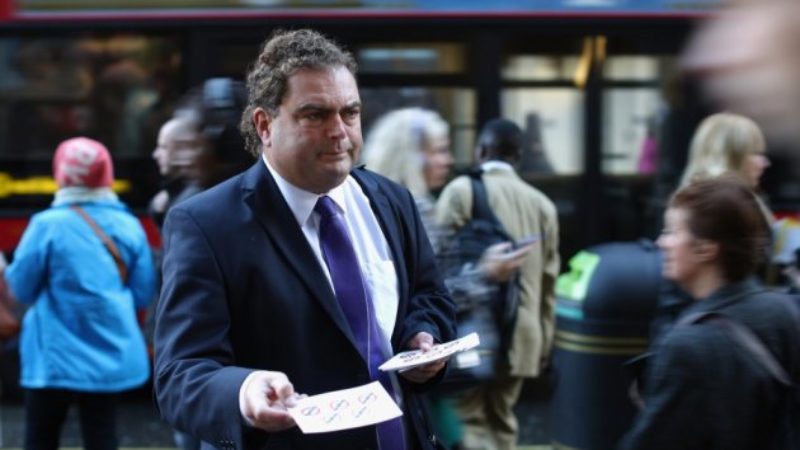
Transport workers’ union TSSA has labelled a £1bn government cut to the rail infrastructure budget “shortsighted and reckless” and called on ministers to “come clean” about where savings will be made.
TSSA general secretary Manuel Cortes said the government needed to tell the public which rail projects would be ditched and how safety would be maintained with the planned reduction in funding.
Railways minister Chris Heaton-Harris revealed earlier this week that Network Rail’s budget for enhancements from 2019-2024 would fall from £10.4bn to £9.4bn following the Chancellor’s spending review.
Commenting on the plans, union leader Cortes said: “Without doubt cutting investment in our railways is both shortsighted and reckless, particularly when borrowing costs are at a historic low.
“Rail infrastructure is no small thing; it’s the lifeblood of a safe network and the government must come clean and explain exactly which projects it wants to see ditched, and how they propose that will work in practice.”
He added: “Frankly this is the wrong decision and one which, worryingly, casts doubt over some long-planned improvements to our rail infrastructure.”
The transport union head also noted that Chancellor Rishi Sunak did not mention the proposed cut in his statement to the Commons last week, which championed the government’s so-called “levelling-up” agenda.
“Yet as ever with the Conservatives, once you look at the small print, what they say and do are two very different things. You can’t trust Boris Johnson and this lot as far as you can throw them,” Cortes said.
In response to the TSSA’s comments, a Department for Transport spokesperson told LabourList that projects were being “reviewed to reflect the changing demand for rail services” due to the coronavirus pandemic.
“Alongside the billions invested in supporting our railway through the pandemic, protecting services passengers depend on and frontline jobs, we continue to invest significant sums in modernising our railway for the reliable, punctual, safe journeys people deserve,” they said.
“We must ensure that, where necessary, projects are reviewed to reflect the changing demand for rail services as a result of the pandemic.”
The spokesperson added: “We must also strive for a better deal for taxpayers, given the scale of their support for railways. We are therefore closely examining all of our spending to ensure that it is efficient and represents value for the taxpayer.”
Meanwhile, the Railway Industry Association, the trade body for the UK rail supply community, said the reduction in enhancements investment was “very disappointing”.
“Rail enhancements are essential in ensuring our rail network is fit for the future, improving reliability, connectivity, customer experience and helping to reduce carbon emissions,” chief executive Darren Caplan commented.
“Taking our foot off the pedal now on rail investment will not help for when passengers return following the coronavirus pandemic.”
Labour’s Shadow Transport Secretary Jim McMahon has previously called for increased investment in the UK’s rail infrastructure and criticised plans for an “inflation-busting” rise in rail fares.
In an interview with inews in June, McMahon argued that the Chancellor had “found the magic money tree” amid the novel coronavirus pandemic and called for a similar attitude to be adopted by government for transport spending.
“We need to find the same determination to fund the railway, and the recovery from Covid, as we found to fund our way through the pandemic,” the Shadow Transport Secretary said.
Writing for LabourList in September, McMahon said infrastructure – as well as modes of transport – should be “a focus of our attention”. The shadow cabinet member demanded a commitment to projects that will “deliver for local people”.
In November, Cortes criticised the Chancellor for showing a “lack of leadership” by failing to mention the climate crisis during his spending review statement delivered to parliament.
The TSSA general secretary also joined other trade unions in criticising the government for failing to take advantage of low interest rates to increase investment spending and deliver on ambitious climate targets.
“With debt repayments going down as a result of low interest rates – even when we have increased borrowing – now was the time to borrow more in order to kick start a green new deal,” Cortes said last month.
“That is the only route to an economy which can endure in the decades to come without catastrophic damage to our planet. The lack of leadership from the Tories on this amounts to a tragic missed opportunity.”




More from LabourList
‘Factionalism at the top is weakening Labour – and handing a gift to Reform’
‘Europe must stand strong on its own as US security guarantees grow conditional’
‘Tackling poverty should be the legacy of Keir Starmer’s government’